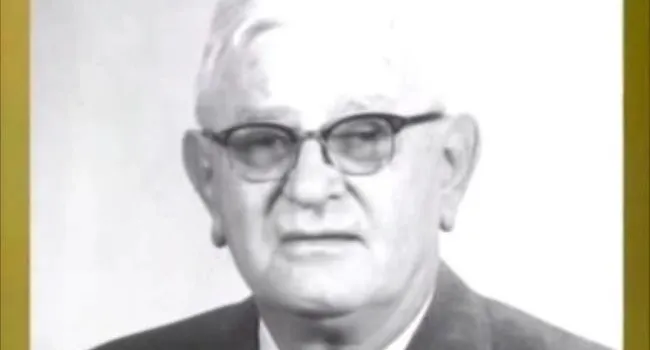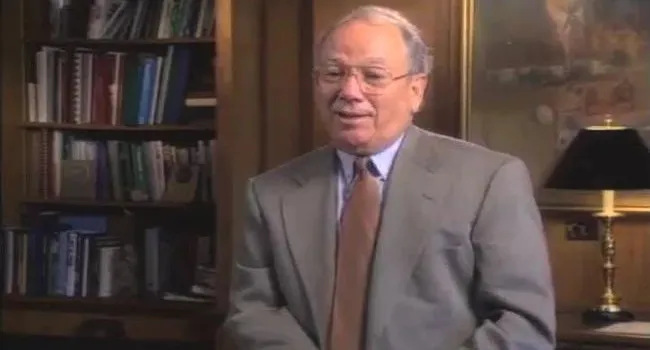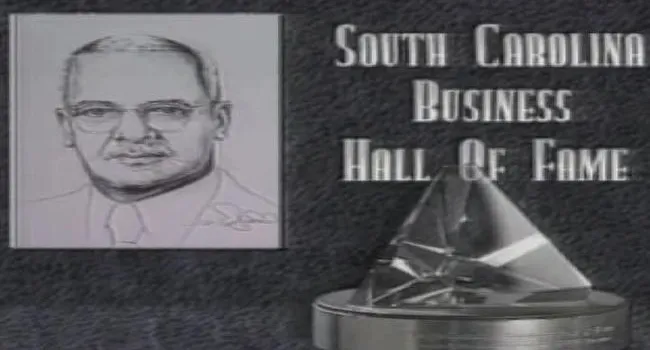Ira M. Koger
(1912-2004)
Ira Koger has enjoyed success in many endeavors, but real estate development has brought him fame and fortune and the opportunity to serve the communities he has called home.
He is credited with creating the office park concept and, since 1957, he has designed, built, financed, and leased more than 30 office parks in the Southwest and Southeast, from Tulsa, Oklahoma, and El Paso, Texas, to Norfolk, Virginia, and Miami, Florida. The office parks embrace more than 300 buildings, producing about $150 million in annual rent.
Ira McKissick Koger was born December 5, 1912, in Charleston, a son of Ira M. and Bessie Evans McMillan Koger. His father was a well-to-do food broker. Koger attended Mount Pleasant Academy and graduated from Boys High School in Charleston. During summers, he worked for his father and enjoyed sailing his own boat in Charleston Harbor.
Koger began his business career as an advertising executive and broadcaster, but his eventual success in real estate gained him wealth and his firm a listing on the New York Stock Exchange. A patron of the arts, he is nationally known as a connoisseur and collector of American impressionist paintings, English and American furniture, and ancient Chinese ceramics.
As a young Charlestonian, he wanted to be a writer or musician, but when he graduated from the College of Charleston in 1933, he was persuaded to go to the University of South Carolina law school.
At USC he became involved with the campus Young Democrats. He liked politics and, at the age of 21, ran successfully for the state Legislature from Charleston, serving during 1935 and 1936. At the time, he was the youngest member ever to serve in the House of Representatives. He was also one of the youngest authors of South Carolina's first workmen's compensation law.
Koger dropped out of law school after two years and his term in the Legislature and sought a career in broadcasting. He went to work at WIS Radio in Columbia. He had fallen in love with a local girl, Nancy Tedder, and wanted to marry her, but young lawyers in those days didn't make much money. They couldn't afford to get married until 1937.
Koger moved from WIS to WTOC in Savannah and back to WIS. He went to Jacksonville, Florida, to serve as advertising manager for an afternoon newspaper, and then moved to a local radio station there. In 1944, he entered the Navy as an ensign and left it in 1946 as a lieutenant, junior grade. He returned to Jacksonville to resume his broadcasting career.
Shortly thereafter, he was hired by his wife's great-uncle, O. P. Woodcock, to help operate Woodcock's Jacksonville construction company. Koger recalled, "He was in his 80s and his construction company needed new management, and he had a lot of property... He was very anxious to have somebody look after his property."
That was the turning point for Ira Koger. The company thrived and spread its business throughout the Southeast. After Woodcock's death in 1953, Koger bought the company and began investing in real estate. In 1957, he envisioned and built a landscaped office complex in a suburban area of Jacksonville as an alternative for businessmen to downtown, high-rise offices. It caught on, and during the ensuing years, Koger's office parks spread throughout the Southwest and Southeast.
Ira Koger served as chairman and chief executive officer of Koger Properties, originator of the suburban office park, and served as chairman and chief executive officer of Koger Equity. Koger Properties was listed on the New York Stock Exchange, while Koger Equity was listed on the American Stock Exchange.
He also served as a director of Florida National Bank, as vice chairman of Security Federal Savings and Loan, and director of Florida Trust Company in Winter Haven, a trust organization owned by North Carolina National Bank, forerunner of NationsBank of Florida.
Koger is widely respected as a patron of the arts and devotes himself to cultural developments and events. Ira and Nancy Koger contributed the key millions to the $15 million performing arts center at the University of South Carolina, which was also funded by the City of Columbia and Richland County. The facility is named for the Kogers. The Kogers also funded a Distinguished Professorship in Music, now held by Donald Portnoy, conductor of the University of South Carolina Symphony Orchestra. In August 1998, they gave a concert grand Bosendorfer piano to the Koger Center.
Ira Koger believes the quality of a community's cultural life will attract business, so businessmen should not regard the arts and music as "frills." But Koger is motivated by his own enjoyment of the arts. "Your sensitivity to art will give you a thousand experiences you wouldn't have if you didn't open your eyes and ears," he once told an interviewer.
Ira Koger died May 29, 2004. The Kogers had two daughters, Celeste, who died April 1, 1998, and Pamela, now Mrs. William J. Moore, Jr.
Ira Koger was inducted into the South Carolina Business Hall of Fame in 1989.
© 1999 South Carolina Business Hall of Fame


















